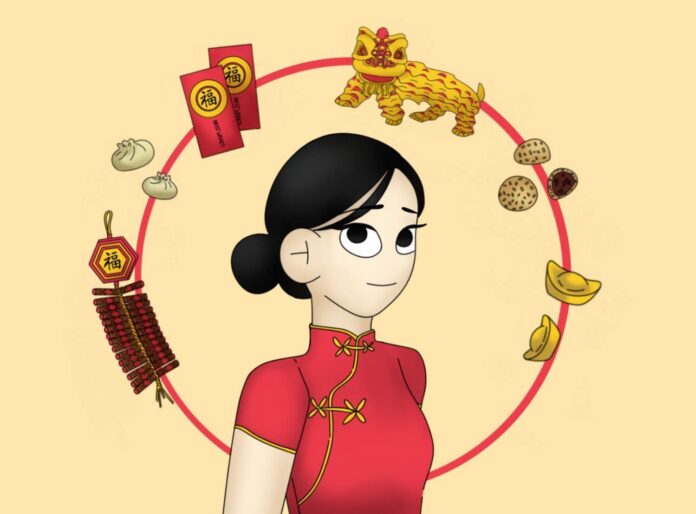As I parade around the Austin Asian American Cultural Center with a bowl of fresh jian dui (sesame balls) in my crisp new qi pao (traditional Chinese dress), I bop my head to the sound of tang gu drums accompanying lion dancers who are entertaining the crowd. Older community members clutch hong bao (red envelopes) to give children in hopes of them bringing good luck for the new year as they patiently wait in line to buy nian gao, a southern Chinese rice flour cake believed to bring prosperity if eaten during the Lunar New Year.
These were the scenes of my childhood growing up in a central Texas suburb with an active Asian American community. Every year during Lunar New Year, I looked forward to feasting on authentic Asian food and performing traditional Chinese dances with my dance school. In my culture, the Lunar New Year signifies the beginning of the lunar calendar year, and in China, it is also known as chun jie, the Spring Festival. The Lunar New Year falls on a different Gregorian calendar day each year and celebrations last 14 days. Celebrating the Lunar New Year growing up was always a harmonious time intensified by the feeling of belonging and acceptance.
I was born in Cangwu county, Wuzhou in the Guangxi Zhuang Autonomous Region in China. I was adopted by an American family when I was a year old and have been living in the U.S. since. Despite having left my home country so early in life, I retain strong ties to my homeland through language, culture and lifestyle. I began my Chinese language and dance education before I even started kindergarten, where I quickly became as fluent in Mandarin as my peers who had Chinese parents. I could not be more thankful for my parents’ commitment to encouraging me to embrace my native culture.
It was a culture shock coming to Oxy, as the Asian student body population is less than in my elementary, middle and high school. I was quick to recognize that even though we are all thrown under the same umbrella ethnicity of “Asian,” the ways we were culturally brought up were very different. Many students I encountered didn’t have the privilege to learn their mother tongue or weren’t exposed to the important cultural traditions that defined my childhood. It made me appreciate my parents’ commitment to me growing up surrounded by Chinese culture even more.
Celebrating the Year of the Rabbit this year was a far cry away from the familiar aroma of steamed fish and peeled tangerines with aunties hanging red lanterns up around their houses in preparation for the Lantern Festival, the holiday signifying the end of the two-week chun jie celebration. In my slump of feeling culturally removed this year, I mustered up the courage to order some Chinese food and invited my closest Oxy friends to share it with me to distract myself from my loneliness. As we scarfed down a large table of noodles, soup and vegetables, I teared up remembering the festivities of my childhood as they asked about each dish and what I’d be doing to celebrate if I were back home.
The small get-together I had impulsively planned was inherently nothing special — I saw these friends all the time and the food was no better than mediocre. In fact, it was the most Americanized Lunar New Year celebration I’ve experienced — a group of college students eating pan-fried pot stickers and bok choi soaked in garlic with plates and forks while blasting SZA’s new album through a portable Bose speaker. Nonetheless, it was still an event dedicated to celebrating the Lunar New Year. The night ended with dancing and joking around the table, leaving my thoughts of feeling culturally unfulfilled less potent than just a few hours before.
I’ve realized that my desire to continue the traditions and celebrations of my past is a way I try to connect and stay tethered to my culture. The ways I engage with and participate in Chinese holidays are dependent on the communities I’m exposed to. Navigating my cultural identity will always be a journey I’m on, but making efforts to celebrate the holidays of my home country will help me stay grounded. I consider myself lucky — most transracial Asian adoptees have little or no knowledge of their ethnic culture because of growing up in predominantly white households, making me want to continue celebrating cultural holidays, like Lunar New Year, even more.
Lunar New Year definitely looked different for me this year. However, it did not fall short of the joy I usually feel during this time of year. Just because cultural celebrations change and are considered less “authentic” does not mean they are any less important or valid than those in their place of origin. Cultural celebrations reflect the places people have been and the experiences they embody, and I feel no shame in changing the way I celebrate Lunar New Year to reflect where and who I am.
Contact Anna Beatty at beatty@oxy.edu.
![]()































